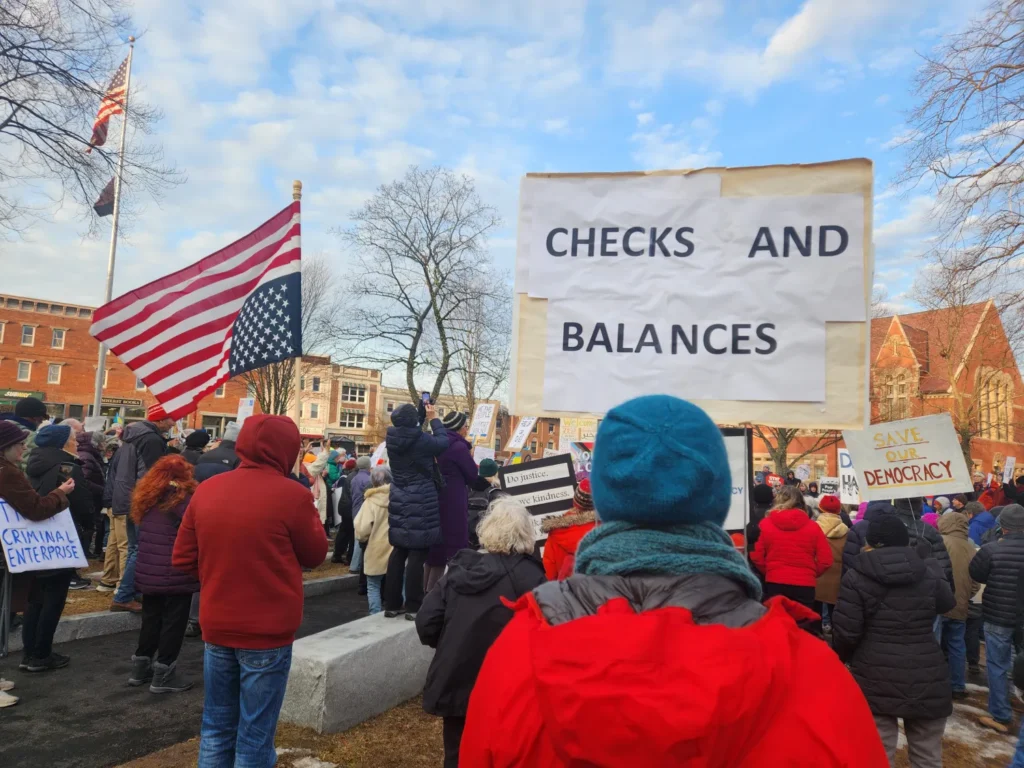Opinion: Amherst Housing Watch: Who’s Who in This Election

Photo: Rizwana Khan

Downtown Amherst is at a crossroads. Residents just pushed petitions for a 1-year moratorium on new multi-unit buildings downtown basically saying, “UMass, house your 5,000 extra students on campus first, and stop investors from snapping up our family homes.”
Here’s the vibe from councilors:
- The Protectors : They talk families, long-term residents, and community schools. If you care about keeping Amherst livable for year-round residents, these are the voices to watch.
- The Procedurals : Neutral, calm, referring petitions to boards and committees. They’re less about taking sides and more about “rules first.” Good if you value process, but not bold moves.
- The Developers’ Friends? : Support downtown growth and new builds, less worried about investor LLCs. They see the market as the answer, not petitions.
💡 Quick Take: Amherst’s housing future is a tug-of-war between families, students, and investors. Watch who frames the conversation as community-first vs. market-first your key to knowing which councilors have your neighborhood in mind.
#AmherstMA #LocalElections #HousingCrisis #CollegeTownPolitics #UMass
It’s late October in Amherst, and on social media feeds and in the coffee shops, the topic everyone’s talking about is housing—specifically, who gets to live downtown, and under what rules.
A couple of petitions are making waves—Articles 18 and 19—calling for a one-year moratorium on new multi-unit residential builds downtown. The reasoning? The town wants to make sure UMass Amherst actually houses its 5,000 extra students on campus before developers flood the downtown with yet another apartment building. Layered on top is language aimed at LLC investors snapping up single- and two-family homes, making it nearly impossible for families who actually want to raise kids in Amherst to find a place.
Councilors are reacting in ways that tell you more than their statements alone. Take Jennifer Taub, who frames it almost like a moral mission: protecting the long-term family presence, not shunning students. Her priority is the non-student population, which is steadily shrinking. Other councilors, meanwhile, have kept things procedural: the petitions got referred to the Planning Board, rather than being adopted outright—votes split between “yes,” “no,” and “abstain.” The message? Careful, slow governance, but with a recognition that residents are watching—and they’re serious.
If you’ve ever checked out Princeton University, Amherst’s struggles might feel familiar but milder. There, off-campus rents hit $2,500 a month for a one-bedroom. Investors, often organized as LLCs, dominate the listings, leaving students—and anyone else—scrambling. Amherst hasn’t hit that extreme yet, but the dynamic is eerily similar: investor-owned homes pushing out local residents, students being shuffled into a tight rental market, and the town trying to wrest some control back through zoning and petitions. It’s a cautionary mirror.
It’s hard not to read between the lines during the election cycle. Some councilors are protective of year-round residents, signaling a willingness to challenge developers. Others lean procedural, almost neutral, letting committees and boards run the clock. And a few seem almost implicitly pro-development, nudging the town toward whatever the market dictates. Your takeaway: pay attention to who frames the debate around families vs. students, LLCs vs. community, and long-term strategy vs. procedural caution.
Downtown Amherst is more than streets and storefronts—it’s a tug-of-war between short-term profit, long-term community, and who really counts as a resident.
Rizwana Khan is a resident of Amherst and a member of the town’s Human Rights Commission

Amherst rental housing prices have already blown past Princeton rents with 453 sq foot studio for $2550 at Aspen Heights. Google UMass off campus housing and see what’s been happening here in Amherst and surrounding towns. Vote for candidates who are awake, aware and working towards solutions not process.
See my opinion re: the Progressives vs. the Neo Liberals.
https://www.amherstindy.org/2025/10/24/opinion-in-amherst-town-elections-its-progressives-vs-neoliberals/
It’s worth noting that in the vote on referral of Article 18 to the Planning Board, George Ryan, Mandi Jo Hanneke, Andy Steinberg and Pat De Angelis voted against, even though state law requires referral. Griesemer voted for referral but tried unsucsessfully to block the proposals’ referral via a KP Law opinion. Ryan acknowledged that the council was legally required to refer but was advised by the town manager that there would not likely be consequences if they did not, so he recommended not referring.
https://www.amherstindy.org/2025/10/08/citizens-zoning-petitions-referred-to-planning-board/
And the reason state law requires it is that the Planning Board members are the experts on zoning, not the Town Council members .The law respects the right of residents to bring a zoning proposal and have it go directly to the Planning Board. Griesemer, Ryan and Hanneke have blocked public participation in multiple ways in their years on the Town Council as has new candidate Andy Churchill on both the Charter Commission and the Charter Review Committee. I recommend not voting for any of Griesemer, Ryan, Hanneke, or Churchill.
Rizwana,
Framing it as a developers vs. students vs. long-term residents is divisive. Too many residents are applying the language of anti-immigration advocates to the local housing scene.
“The Protectors” are the “America First” coalition
“The Proceduralists” are neoliberals
“The Developers’ Friends” are globalists.
According to this narrative, town councilors owe a greater moral duty to a year-round resident than to a student. This is true even though (like immigrants) students are a net positive for our local budget. As a long-term resident, however, I am a net drag on affordability and fiscal sustainability in Amherst.
I bought a “legacy” residence and paid above-market price, driving up the cost of living for all Amherst residents. Despite paying $10,000 in annual property taxes, I have two kids in the public schools. As such, the town budget is around $40,000 poorer every year that I live here (as long as my kids attend the public schools). Furthermore, since I live in a house on the fringe of town, Amherst must spend more on plumbing/electricity/roads, etc. than someone who lives in a downtown or “developed” building.
This is an uncomfortable truth, but we libs follow the evidence, right? UMass kids are literally faultless in this scenario. They were 12 years old when UMass decided to increase enrollment, and our town council dragged its feet on new construction.
I have yet to see a single “Protector” proffer up a single evidence-based plan showing how 18 or 19 would increase housing affordability in Amherst. They claim we need a yearlong moratorium to “think,” yet we introduced the same exact legislation four years ago. Why didn’t we “think” up a plan in the intervening time? Want to know the top ten most affordable college towns to live in?
1. Cookeville, Tennessee
2. Conway, Arkansas
3. Louisville, Kentucky
4. Memphis, Tennessee
5. Murfreesboro, Tennessee
6. Omaha, Nebraska
7. Tulsa, Oklahoma
8. Ashland, Ohio
9. Cedar City, Utah
10. Jonesboro, Arkansas
(https://www.greatvaluecolleges.net/50-great-affordable-college-towns-in-the-u-s/)
Guess how many of those municipalities have anti-student zoning and anti-development local governments? It’s an uncomfortable truth, but red states are more progressive on housing than blue states. It’s just a fact.
Every liberal scholar studying housing agrees that for-profit development is the primary mechanism for increasing affordability. Here’s Obama: “The accumulation of barriers – including zoning, other land use regulations, and lengthy development approval processes – has reduced the ability of many housing markets to respond to growing demand.” I will again challenge readers: please show me a peer-reviewed study showing one instance of supply restriction leading to lower housing prices. The National Low Income Housing Coalition “conclude[d] that in both Los Angeles and San Francisco, new market rate construction generally increased the probability of low-income renters moving into neighborhoods, with little variation across neighborhood types.”
So, if “The Protectors” vote to restrict supply, knowing that it will increase prices and decrease revenues, who are they protecting? If your gut tells you moratorium, but a consensus of liberal housing experts suggests you build, who should you listen to? Call me whatever names you want, but I’m following the evidence.
https://journals.sagepub.com/doi/10.1177/0739456X241264284
https://penniur.upenn.edu/publications/universities-and-affordable-housing-seven-case-studies
Your anti- immigration comparison doesn’t fly at all when the zoning proposals are not anti anything. They are pro year round resident, especially those who are cost burdened.
Apparently, NOT restricting supply increases prices as evidenced by Amherst’s current housing costs. Many of those who have moved away did so for that reason. Thoughtful, controlled development, targeted at populations of year round residents that need housing is where we want to go.
I view the amendments as a good starting point for conversation . If it weren’t for the amendments, we wouldn’t be talking, and sharing our thoughts on this matter .
This conversation is long overdue.
In my opinion,the moratorium is a great idea .
If this is what it takes to force the conversation, so be it .
How many rentals out where you are Evan? We bet not many. We are surrounded with 45 years of being disturbed at all hours. Always more students and cars that are supposed to be at these houses. We agree with Cinda Jones:
“ Let’s get real. The problem isn’t the buildings or the investors or the free market, it’s student behavior. So why don’t we ask UMass to focus on that? Why don’t we have higher standards for that?”
The DPW and Fire complex’s should have been done way before the Library. Look at where we are with it now! They have the nerve to ask for CPA money! What a mess. The DPW and Fire on the other hand have waited decades and work in unsafe quarters. Start concentrating on the essentials. Maybe you can afford another override but many can’t.